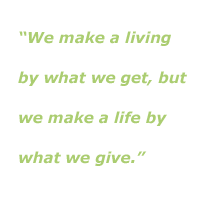Winston Churchill once said, “We make a living by what we get, but we make a life by what we give.”
It is easy to get caught up in the hustle and bustle of our lives and simply minimize the importance of making an impact while we are here. Maybe you think you’re not influential enough- that only the rich or the powerful can impact their communities. The truth is, every day- through every action- you have the opportunity and the ability to influence and IMPACT family, friends, coworkers and members of your community.
What is Impact? To impact someone is to mark them indelibly or otherwise alter their trajectory due to a deep, core-level influence.
Seem extreme? Let’s think about it. We are impacted forever if a natural disaster destroys our home, our property, and so on. This event impacts our lives on a deep level. We are also impacted when a community comes together to help rebuild after that storm; providing shelter, food and clothing- positively impacting the lives of a community.
From providing critical services that contribute to economic stability and mobility to inspiring us to be better people nonprofit organizations play a vital role in building healthy communities. They strengthen communities as leaders, champion social issues to affect change, assist other businesses with community efforts and demonstrate that solutions to difficult problems do exist.
How do know if you’ve affected change? What has your impact been?
Measuring your impact can feel like a chore, but the long-term benefits vastly outweigh the short-term inconveniences. The impact nonprofits have in communities can have ripple effects throughout society as they continue to identify and create solutions for unmet needs.
United Way of Mesa County (UWMC) in Grand Junction, Colorado is no stranger to Impact.
Abby Landmeier, Manager of Community Funding & Volunteers at UWMC explains it well:
“Not using the right data tracking tool is like going on a hike and asking others to come along without a map or trying to track your daily steps without a Fitbit®.
Having the ability to collect and analyze data is part of being a good steward. Without good data, your ability to see the history of the work and effort is difficult. Essentially, there is no way to see if you’re being a good steward.”
Benefits of using a data management system:
And to sum it up, Abby states, “This year we added Social Determinants of Health questions to our application. I needed to get specific data quickly for a new volunteer to review. What would have required me to go through 41 grants reports took less than five minutes using e-CImpact! Not only was I able to pull the data quickly, I had the ability to see the nuances of the information and language entered by the agencies across the Focus Areas. Prior to using e-CImpact, we weren’t seeing this. Having this information has been a pivotal piece in setting the stage for our multi-year funding. We are now able to “magnify” a Focus Area, see the connections among agencies, and dig deep, to get a thorough understanding of the what is needed.”
